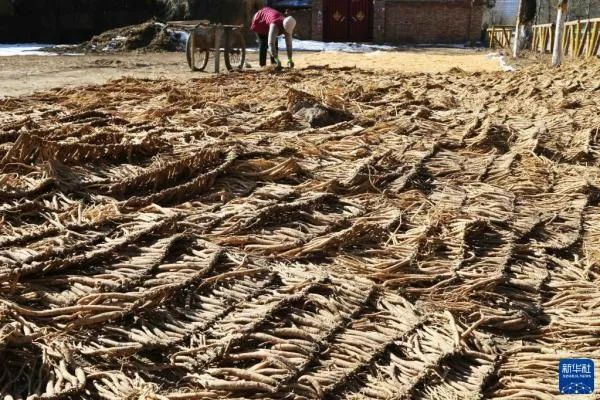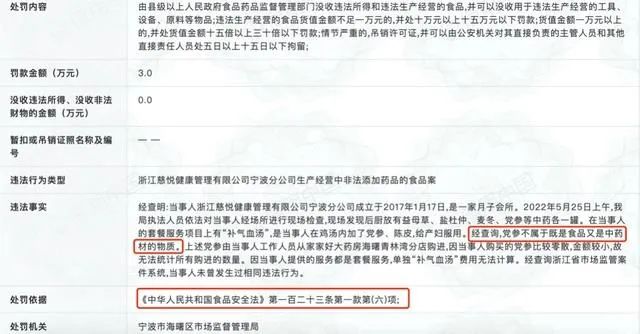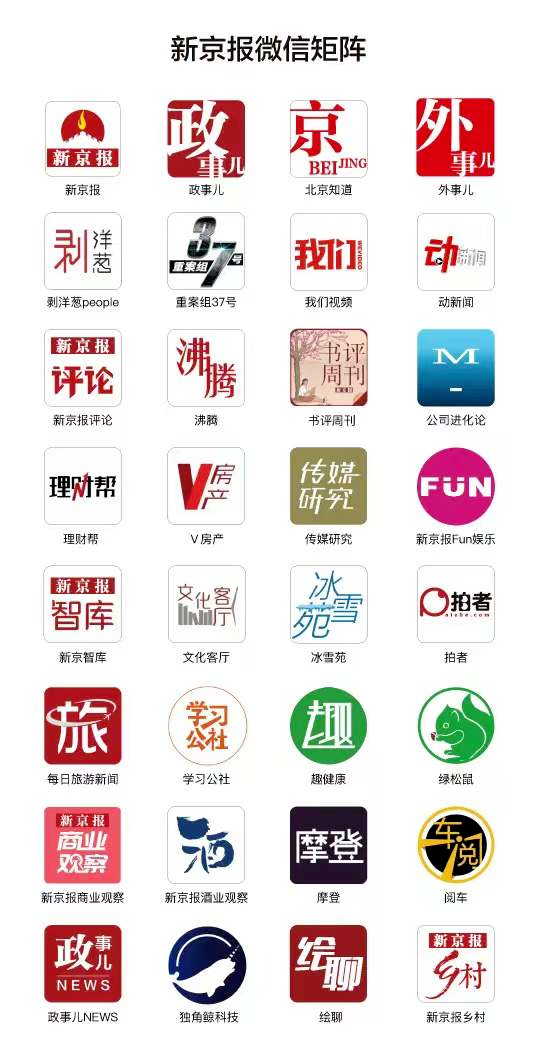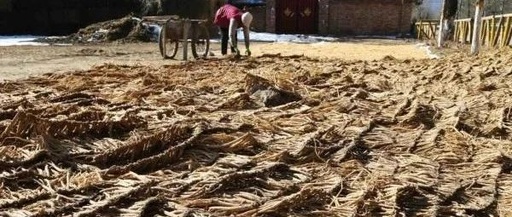 A single Chinese medicinal herb cannot be judged as a food ingredient based solely on dietary traditions and life experiences; it must be based on scientific principles.
A single Chinese medicinal herb cannot be judged as a food ingredient based solely on dietary traditions and life experiences; it must be based on scientific principles. ▲Reference image. Farmers in Sizu Town, Zhang County, Dingxi City, Gansu Province, drying Dang Shen. Photo/ Xinhua News AgencyWritten by | Xie Xiaogang
▲Reference image. Farmers in Sizu Town, Zhang County, Dingxi City, Gansu Province, drying Dang Shen. Photo/ Xinhua News AgencyWritten by | Xie Xiaogang
Recently, the incident of a postpartum care center being fined for adding Dang Shen (Codonopsis pilosula) to chicken soup has attracted public attention.
According to reports from China News Network, law enforcement officers from the Haishu District Market Supervision Administration in Ningbo conducted an on-site inspection of a postpartum care center and found jars of medicinal herbs including Yi Mu Cao (Leonurus japonicus), Mai Dong (Ophiopogon japonicus), and Dang Shen in the kitchen. The establishment added Dang Shen and Chen Pi (Citrus reticulata) to the chicken soup for postpartum women, but Dang Shen is not classified as both a food and a medicinal herb. The establishment violated relevant regulations of the Food Safety Law of the People’s Republic of China and was fined 30,000 yuan.
Dang Shen chicken soup, a dish considered ordinary by many, has now been penalized, leading to much discussion online—can Dang Shen be casually used to make chicken soup?
Historically, there has never been a strict boundary between food and medicine. In traditional Chinese dietary culture, some medicinal herbs have long been widely consumed. Some substances that are traditionally considered both food and medicinal herbs are referred to as “food and medicine from the same source”.
In fact, the Food Safety Law of China clearly states that “medicines must not be added to food produced and sold,” which includes the indiscriminate addition of Chinese medicinal herbs. According to industry insiders, if one buys it for personal consumption, the risk is borne by the individual, but operators cannot add it to food because the risks are uncontrollable. According to the directory of substances that are traditionally both food and medicinal herbs, Goji Berries (Lycium barbarum), Chen Pi, and others are included, but Dang Shen is not listed.
In 2020, the National Health Commission issued a notice regarding the pilot management of nine substances, including Dang Shen and Rou Cong Rong (Cistanche deserticola), as substances that are traditionally both food and medicinal herbs. Following this, various provinces also formulated specific pilot policies to actively respond to the pilot work. However, due to differing local conditions, the pilot policies vary. Zhejiang Province has only specified standards and plans for the production and management of three substances: Shi Hu (Dendrobium), Ling Zhi (Ganoderma lucidum), and Shan Zhu Yu (Cornus officinalis), none of which include Dang Shen.
Therefore, the addition of Dang Shen to chicken soup by the postpartum care center indeed constitutes illegal addition of a medicinal substance, and the penalty is justified. The controversy surrounding this incident is not necessarily a bad thing; at least through debate, it can deepen people’s understanding of “food and medicine from the same source.” Whether a medicinal herb can be used as a food ingredient cannot be judged based on dietary traditions and life experiences; it must be based on scientific principles.
 ▲Administrative penalty decision document of the involved company. Screenshot from the Credit China websiteThe controversy also reveals that many people currently have misconceptions about “food and medicine from the same source,” simply equating food with medicine, and blindly using medicines as food when treating illnesses or regulating the body, or exaggerating the medicinal value of certain foods in pursuit of their healing effects. This is incorrect. Not everything can be explained by “food and medicine from the same source”; this is irresponsible towards one’s health.
▲Administrative penalty decision document of the involved company. Screenshot from the Credit China websiteThe controversy also reveals that many people currently have misconceptions about “food and medicine from the same source,” simply equating food with medicine, and blindly using medicines as food when treating illnesses or regulating the body, or exaggerating the medicinal value of certain foods in pursuit of their healing effects. This is incorrect. Not everything can be explained by “food and medicine from the same source”; this is irresponsible towards one’s health.
For example, if a postpartum woman exhibits symptoms of “excess heat syndrome” such as constipation, it is not suitable for her to consume Dang Shen. The famous TCM text “Shiba Fan, Jiu Shi Wei” includes the prohibition of “all ginsengs and peonies against licorice.” It is evident that consuming Chinese herbs without professional medical guidance is not in line with TCM knowledge systems and violates modern food and drug regulatory systems.
Dietary therapy and medicinal cuisine are not the same concept. The former uses food for regulation, while the latter transforms substances typically classified as “medicinal” into palatable food. Currently, many health programs and wellness content on social media are poorly produced and lack strict content oversight, leading to the serious misinterpretation of the rigorous concept of “food and medicine from the same source” as a convenient item that can be easily enjoyed at home. In recent years, there have been numerous cases of serious consequences due to blind supplementation and misuse of medicinal foods.
Therefore, the incident of “adding Dang Shen to chicken soup resulting in a penalty” serves as a warning. Although “food and medicine from the same source” is an important TCM concept, it is not a catch-all; one cannot simply add whatever they want and consume as much as they wish.
As the main body of dietary therapy, the public should consciously refuse “blind supplementation” and the misuse of “medicinal foods,” and improve their health literacy. Relevant departments should also strengthen the promotion of laws and regulations and the directory of food and medicinal substances, enhancing the public’s and businesses’ ability to distinguish between medicinal foods, clarify medicinal compatibility, and truly overcome the misconceptions surrounding “food and medicine from the same source.”
Written by / Xie Xiaogang (Staff)
Edited by / Liu Yunyun
Proofread by / Wu Xingfa
Click the public account name card below to read more exciting viewpoints

